Sri Lankan weddings are a colourful tapestry of rituals, customs, and celebrations passed down through generations. Nestled in the heart of the Indian Ocean, the island nation of Sri Lanka is not only known for its stunning natural landscapes but also for its rich and vibrant cultural heritage. The Lankan wedding ceremony is one of this heritage's most significant and cherished aspects.
The traditional bridal attire is a gold and white sarees, while the groom wears turbans and sarongs. Traditional Sri Lankan weddings have a lot of followers because of the diversity in culture and tradition that steals our hearts. Let's explore the rituals, traditions and food culture of Sri Lankan traditional weddings.
Sri Lankan Ethnic Communities
Sri Lanka provides shelter for various ethnic groups, like Indians, Tamils, and Muslims, across the world. Thus, the traditions and culture followed at each of their weddings are entirely different. You can expect a blend of their parent culture and Sri Lankan traditions on their special occasions.
Sinhalese
It is believed that the Sinhalese group originated at the time of Prince Vanga and they are the original Sri Lankan natives. They are renowned for the traditional dance forms and self-defence martial arts called Angampora. These traditions are reflected in their wedding attire, and Sinhalese people speak the language Sinhala or Helabasa.
Sri Lankan MoorsThe Sri Lankan Moors are Muslims who follow the blended culture of Arabs and Tamils. Most of their wedding rituals resemble Arabic culture. They conduct a great feast that is shared on a large plate during their wedding occasions.
Indian Moors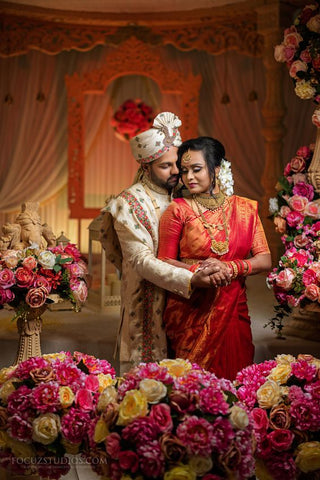
As the name indicates, Indian Moors are people who migrated from India during the British Colonial period. The majority of the community is Muslim, and thus their wedding started with the Nikah ceremony. There are a lot of pre- and post-wedding ceremonies in this community and the event will be an extravagant one. Thus, the wedding ceremonies have slight similarities to South Indian wedding traditions.
Sri Lankan Tamils
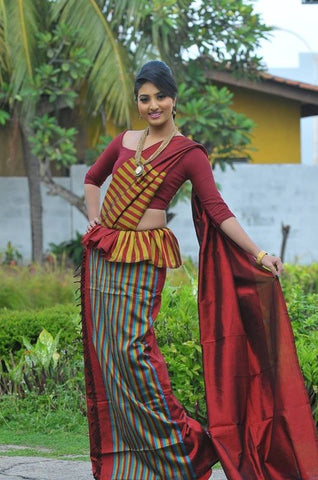
Sri Lankan Tamils are also considered the original natives of Sri Lanka. They have a slight connection and cultural similarity with the Sinhalese. Based on the geographical area of their lives, they are again divided into Negombo Tamils, Jaffna Tamils, and Eastern Tamils. Sri Lankan brides also follow different saree draping styles for their wedding.
Sri Lankan Weddings: A Cultural Masterpiece
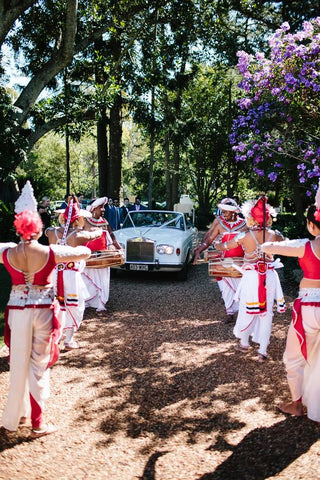
Weddings are the union of two souls and thus the event is considered more than a private one but a social one. The speculative rituals, traditions, and bridal sarees at a Sri Lankan wedding made the ceremony unique among other occasions. The Nakath and Poruwa ceremonies are the two important rituals in Lankan wedding ceremonies.
Let's examine the customs surrounding Sri Lankan wedding ceremonies, from engagement to post-wedding.
1. The Nekatha Ceremony
The Nekatha is a very important pre-wedding ritual in Sri Lankan Buddhist weddings. It is the process of determining the auspicious time and date for the wedding ceremony and this is determined with the help of an astrologer based on the horoscopes of the bride and groom.
2. The Poruwa ceremony

After the Nekatha for the wedding is finalised, the Poruwa ceremony begins to be held based on Sinhala traditions. The Poruwa ceremony is the central and most important ceremony in a traditional Sri Lankan wedding. The Poruwa is a decorated platform that represents the home that the couple will share together. It is typically made of wood and is decorated with flowers, leaves, and other auspicious symbols.
The ceremony begins with the bride and groom entering the Poruwa and they greet each other with palms held together in the traditional manner. One of the close relatives or friends will give betel leaves to the couple, which they accept and then place on the poruwa. This is a symbolic offering to the gods and ancestors.
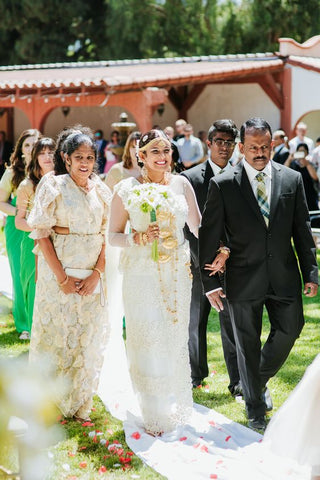
Then the father of the Sri Lankan bride will place the right hand of the bride on the right hand of the groom. This shows the handing over of the precious daughter to the groom to take care of her for the rest of her life.
3. Nalangu and Ring Exchange
During the Poruwa ceremony, the couple will exchange rings with each other, showing their commitment. Nalangu is another ceremony in which the bride and groom tie their fingers with a golden thread to show unity.
4. Hetti Paththuwa
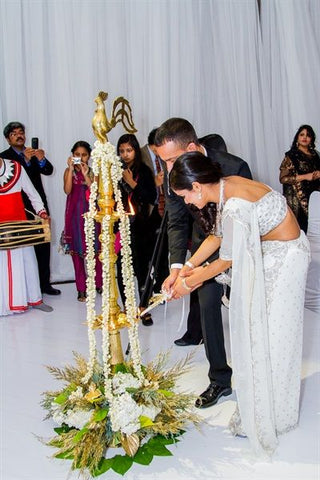
In order to get blessings from the deities to begin the life of a new journey, couples and their families light traditional lamps. This ceremony is called Hetti Paththuwa.
5. Milk mixing and Kiribath

The couples will pour the milk together into decorated vessels, indicating the joining of the two families and couples. Kiribath is a type of rice cake made specifically with rice and milk.
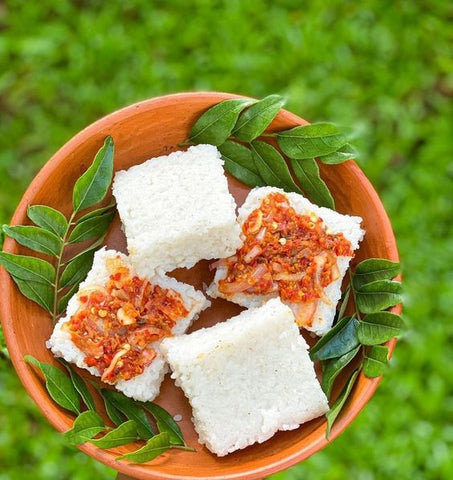
The bride's mother will give the couple Kiribati, while the groom's mother will give them milk to drink.
6. Muwa Dahanaya

The couple offers betel leaves to the parents in order to show their gratitude and respect for them. The parents and elders will bless them back for a prosperous and everlasting family life.
7. Jayamangala Gatha
This is the traditional music and dance performed at the wedding. “Kandyan dance” and “low country dance" are also performed in order to entertain the guests.
8. Traditional Sri Lankan Sweets
Traditional sweets like Kavum, Kokis, Athisara, etc. will be given to the guests along with the great feast.
Sri Lankan Wedding Outfits
Sri Lankan couples wear a pure traditional wedding outfit that blends Western and Eastern cultures. The global stylists always look at the traditional silk sarees, western veils, and adorable jewels of the bride. Their traditional bridal saree is entirely different from other types of sarees used for weddings.
Bridal Sarees in Sri Lankan
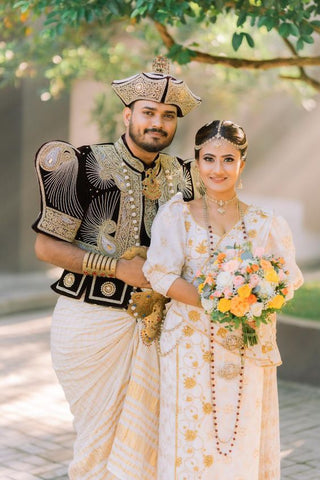
During the wedding ceremony, the Sri Lankan bride wore a heavily embroidered white silk saree with a long-sleeve blouse. Nowadays, fashion-savvy brides prefer the latest saree blouse designs for their wedding. The traditional Sri Lankan bridal saree is rich in gold and silver threadwork.
The traditional Sri Lankan bridal saree is called the Kandyan saree, which is a two-piece attire. One covers the midriff and the other is draped and pleated at the shoulders. Now we can see a change in the kandyan saree to Kanchipuram gold sarees in Sri Lankan Tamil Hindu weddings. Apart from the bridal saree, other wedding jewels and makeup styles are almost similar to those of South Indian brides.
Sri Lankan Wedding Groom Outfit
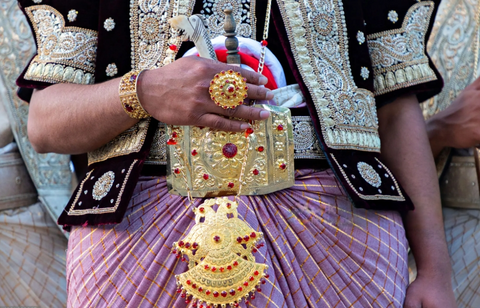
If you are looking for a peculiar and unique wedding outfit, just look at the Sri Lankan groom. The groom's outfit comprises a turban, a jacket, mul anduma, and royal shoes. The outfit for the groom is heavily embroidered from head to toe with gold and silver thread. They also wear matching jackets and shoes and the entire costume is called the Nilame Costume.
If you want to get all the traditional Indian wedding dresses or modern classic wedding dresses, then choose a branded dealer for the same.
Glam up and Flaunt Your Wedding with Khuuba Sarees
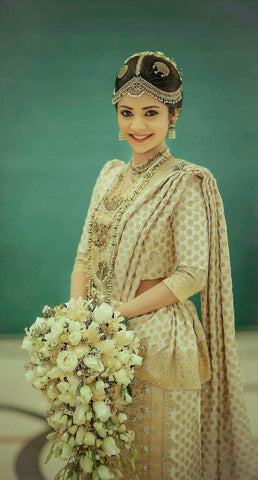
The Sri Lankan wedding is the quintessence of grace and heritage in traditional culture. Every ritual beautifully resembles the unity and beginning of a new life. Their rituals, delicious food, wedding songs, and wedding attire—everything resembles uniqueness.
If you are struggling to find traditional Sri Lankan bridal sarees in Sydney, then look no further! Khuuba is there to meet your needs. Being the top saree shop in Sydney, Khuuba offers pure and original Kanchipuram sarees, Indian wedding sarees, and bridal sarees in Sri Lanka. If you want to get married in Hindu Temples in Australia, there are a lot of specialised priests available from a particular caste. So explore the diverse wedding sarees from Khuuba and celebrate your special occasions in Sydney.
FAQs
1. What do guests wear to a Sri Lankan wedding?
Guests often wear traditional attire like Kanchipuram silk sarees for women or formal shirts with trousers, occasionally paired with a sarong or "osariya" for men at Sri Lankan weddings.
2. What Colour do Sri Lankan brides wear?
Sri Lankan brides traditionally wear richly adorned white sarees in various colour combinations, like red, gold, and silver, often embellished with intricate designs and jewellery, for their wedding ceremonies.
3. What are Sri Lankan wedding traditions?
The Poruwa ritual is the most important part of a Sri Lankan wedding. Several ceremonies and customs are performed while the bride, groom, relatives, and friends stand on the Poruwa.
